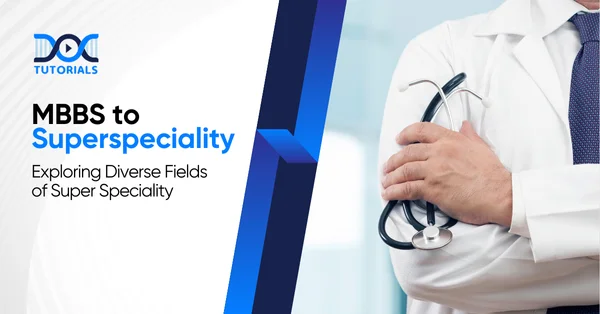MBBS to Superspeciality: Exploring Diverse Fields of Superspeciality

Medicine is a profession that provides endless future opportunities, and those who want to be at the top of their career, super speciality courses can be the next step. Super specialisation courses in medicine are advanced courses that are pursued after finishing post-graduate medical school (MD/MS).
These programs equip doctors with in-depth knowledge about clinical and research expertise that allows them to achieve the highest standards of professional excellence and recognition in their chosen field.
With help from platforms such as DocTutorials, where we offer MBBS and NEET SS courses, aspiring doctors can choose their careers with ease and pick the best option to fulfil their needs. These courses provide you with the opportunity to pursue high-end clinical roles. Keep reading for a detailed insight into super specialisation courses.
What are Super Specialisation Courses?
Superspeciality medicine encompasses highly focused branches of medical practice dedicated to the diagnosis, treatment, and management of specific diseases, conditions, or organ systems. These fields require advanced training, specialised expertise, and cutting-edge technology to provide optimal care for patients with complex medical needs.
Super specialisation courses are the second level of post-graduate medical education. They include advanced degrees such as Doctor of Medicine (DM) and Master of Chirurgiae (MCh). The duration is typically 2–3 years, depending on the chosen field.
These programs emphasise theoretical knowledge, practical skills, clinical exposure, research training, and professional communication.
What are the Super Speciality Medical Courses in India?
The list of super speciality medical courses in India that are prominently pursued by students is as follows:
- Neurosurgery
Neurosurgery is a super speciality focused on the surgical treatment of the brain, spine, and nervous system. Neurosurgeons manage conditions such as brain tumours, strokes, epilepsy, and spinal injuries. Advances in imaging, robotics, and minimally invasive techniques have improved precision, patient outcomes, and recovery times.
- Cardiothoracic Surgery
The cardiothoracic surgery focus is on the operations of the heart, the lungs, as well as the chest. Surgeons are skilled in performing complex procedures, like lung transplants, heart valve repair, and coronary artery bypass. Techniques like robotic-assisted and minimally invasive surgeries improve the results and safety.
- Oncology
Oncology focuses on the prevention as well as the diagnosis, and therapy of cancer. The subspecialties are medical, surgical, or radiation oncology. The use of targeted therapies and precision medicine provides treatments that are specific to genetic mutations, giving patients effective treatment with fewer adverse consequences.
- Cardiology
Interventional cardiology employs techniques that are minimally invasive to treat heart diseases. Treatments like stenting and coronary angioplasty, as well as the replacement of the transcatheter valve, restore blood flow promptly. Modern imaging techniques and catheter-based procedures minimise the need for open-heart operation.
- Transplant Surgery
Transplant surgery involves the transfer of organs or tissues between two people. The specialists perform liver, kidney, or heart transplants. Modern procedures and drugs for immunosuppression are proving more effective and give patients suffering from organ failure new hope in their treatment.
DM (Doctorate of Medicine): Advanced Medical Specialisation
The DM course is designed for doctors seeking in-depth knowledge and skills in specific medical disciplines. Candidates are trained for clinical practice, research methodology, and professional excellence.
Popular superspecialities after MD Pathology in general medicine include:
- Cardiology
- Clinical Immunology & Rheumatology
- Critical Care Medicine
- Endocrinology
- Gastroenterology
- Hepatology
- Infectious Diseases
- Medical Genetics
- Medical Oncology
- Nephrology
- Neurology
- Pulmonary Critical Care and Sleep Medicine
- Pulmonary Medicine
DM specialisations after MD paediatrics:
- Neonatology
- Paediatric Cardiology
- Paediatric Endocrinology
- Paediatric Gastroenterology
- Paediatric Nephrology
- Paediatric Neurology
- Paediatric Oncology
- Paediatric Pulmonary and Intensive Care
Other superspeciality courses after MD medicine include:
- Psychiatry: Addiction Psychiatry, Clinical and Adolescent Psychiatry
- Anaesthesia: Cardiac Anaesthesia, Critical Care, Neuro Anaesthesia, Onco Anaesthesia
- Radiology: Neuroimaging, Neuroradiology, Vascular Radiology
- Pulmonary Medicine: Pulmonary Critical Care & Sleep Medicine
- Pathology: Histopathology, Neuropathology
- Lab Medicine: Hematopathology
- Microbiology: DM in Infectious Diseases
- Nuclear Medicine: DM Therapeutic Nuclear Medicine
- Obstetrics & Gynaecology: Gynaec Oncology, Reproductive Medicine, Medical Genetics
MCh (Master of Chirurgiae): Advanced Surgical Specialisation
The MCh program caters to surgeons looking to enhance their expertise. Candidates gain comprehensive surgical skills, theoretical knowledge, research exposure, and professional communication abilities.
MCh specialisations after MS in General Surgery:
- Breast, Endocrine, and General Surgery
- Cardiothoracic and Vascular Surgery
- Endocrine Surgery
- Head and Neck Surgery
- Minimal Access Surgery
- Neurosurgery
- Paediatric Surgery
- Plastic Surgery and Reconstructive Surgery
- Surgical Gastroenterology
- Surgical Oncology
- Trauma Surgery and Critical Care
- Urology
MCh specialisations after MS in ENT:
- Head and Neck Surgery & Oncology
- Plastic and Reconstructive Surgery
- Surgical Oncology
MCh specialisations after MS in Orthopaedics:
- Plastic Reconstructive Surgery
- Plastic Surgery
What are the Latest Advancements in Super Speciality Medicine?
The latest advancements in the field of super speciality medicine are as follows:
- Continuous Innovation: Superspeciality medicine thrives on constant progress, with doctors leading efforts to improve the diagnosis and treatment of complex diseases.
- Role of Technology: Cutting-edge medical technologies, advanced imaging, and precision techniques have transformed patient care across multiple specialities.
- Interventional Cardiology: Innovations such as catheter-based procedures, stenting, angioplasty, and transcatheter valve replacement have revolutionised cardiovascular treatment, offering safer outcomes and shorter recovery times.
- Neurosurgery Advances: Robotics, imaging, and surgical navigation systems have enhanced neurosurgical precision, enabling complex brain and spine surgeries with fewer complications and improved patient recovery.
- Precision Medicine: Super-speciality doctors employ targeted therapies and minimally invasive procedures to deliver personalised care and achieve superior clinical results.
What are the Challenges Associated With Superspeciality?
Some of the challenges of super speciality medicine that must be looked into are stated below:
- Complexity of Care: Superspeciality medicine requires advanced training and expertise to manage intricate medical conditions. Continuous education is essential to keep pace with rapidly evolving fields.
- Limited Access: Availability of super-speciality care may be restricted in some regions, leading to variations in healthcare quality and patient outcomes.
- Waiting Times and Treatment Gaps: Patients may face long waits for specialist consultations, limited access to innovative treatments, and constraints due to budgetary limitations.
- High Costs: Advanced equipment, technology, and specialised medications often involve significant expenses, posing financial challenges for both healthcare providers and patients.
- Balancing Innovation and Sustainability: Healthcare systems must manage the tension between offering cutting-edge therapies and maintaining cost-effectiveness and long-term sustainability.
FAQs about Super Speciality Courses
- What are super-specialisation courses in medicine?
Super specialisation courses are advanced post-graduate programs like DM or MCh that allow doctors to gain expertise in highly specialised medical or surgical fields.
- Who can pursue DM or MCh courses?
Doctors with completed post-graduate degrees (MD/MS) are eligible. These courses build on prior knowledge, providing advanced clinical, surgical, and research training for professional excellence.
- What is the duration of super speciality courses?
Typically, DM and MCh programs last 2–3 years, depending on the specialisation. Training includes theoretical, practical, and research components, ensuring doctors gain complete professional development.
- How to choose the right super specialisation?
Choice depends on career goals, interests, and patient population. Platforms like DocTutorials provide insights into super-speciality courses after MBBS in India.
- What are the benefits of pursuing super specialisation?
Doctors gain advanced knowledge, clinical skills, research expertise, and professional recognition. It enhances career opportunities, titles, and prospects in both medical and surgical fields.
Conclusion
Deciding on a super specialisation depends on your interests, career goals, and the patient population you wish to serve. DocTutorials provides guidance, curated course lists, and insights to help doctors select the most suitable path.
Super specialisation courses in medicine allow ambitious doctors to achieve mastery in their chosen field. By pursuing DM or MCh programmes, they gain advanced clinical skills, research expertise, and professional recognition. If you’re still preparing for MBBS and planning for superspecialisation courses, explore our MBBS course to excel in your exam! With resources like DocTutorials, doctors can make informed decisions, explore the right courses, and excel in their careers. Whether your goal is super specialisation in medicine or advancing in surgery, these courses provide unparalleled professional opportunities.
Latest Blogs
-

NEET SS Exam 2024: Analysis, Key Dates, Counselling
The NEET SS 2024 exam kicked off on March 29, 2025. Over two days and two slots, candidates across 13…
-

NEET SS 2025 Exam Date, Syllabus, Pattern, PYQs, and Cutoff Marks
The NEET Superspeciality [NEET SS] exam is a computer-based examination that is very important for medical graduates pursuing super-specialty courses…




